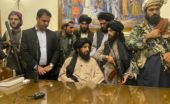Molly Minturn - My family is heartbroken to share that my father died in surgery on Monday, Feb. 10. It…
Afghanistan & Pakistan
Written by Diana Thebaud Nicholson // April 29, 2009 // China, Geopolitics, Robert Galbraith, Terrorism // Comments Off on Afghanistan & Pakistan
(FP Morning Brief) The Pakistani military is fighting to retake the Buner district, just a few dozen miles from Islamabad, from Taliban militants. Both air and ground forces were deployed in Tuesday’s assault. Military commanders now claim to have retaken control of the strategic down of Daggar and to have killed 50 Taliban in the fighting. Pakistan’s redeployment of troops away from the border with India its troubled Northwest comes after heavy U.S. criticism that it was not doing enough to fight the Taliban on the Afghanistan-Pakistan border and domestic outrage over the unchecked spread of the Taliban. The Taliban’s advances into the Pakistani heartland will likely prompt a shift in emphasis in the U.S. Af-Pak strategy toward the “Pak.”
20 April
The dragon in the Hindu Kush: China’s interests in Afghanistan
By Thomas Adams and Arnav Manchanda
It appears that China is forging closer ties with post-Taliban Afghanistan. Afghanistan, meanwhile, is also undoubtedly interested in Chinese investment as it seeks to diversify its international relations away from the West. However, China’s increasing interest in Afghanistan creates a host of implications – within Afghanistan, China and the region as a whole.
26 February
Diplomatic Windfall as Goodwill for Obama Lingers
(NYT) As for “Afpak” — the new shorthand for Afghanistan/Pakistan being popularized by Richard Holbrooke, the new high-level American envoy for the two countries — Mr. Perkovich says that both governments are trying to put their best foot forward. They expect demands from the Obama administration for the Afghan government to do more to fight corruption and drug trafficking, which many in the West believe has helped to fuel the resurgent Taliban and for Pakistan to do more to crack down on extremists in the border region.
CIA: Isolated bin Laden loses control over al-Qaida
As a result of his focus on his own survival and security in the remote borderlands of Afghanistan and Pakistan, Osama bin Laden is increasingly cut off from the daily operations of al-Qaida, CIA Director Michael Hayden reports. Also home to most of the terrorist threats now confronting the U.S., the lawless, tribal region has been increasingly targeted with American drone missile attacks in recent months. The Times (London) (11/14)
11 November
Pakistanis Mired in Brutal Battle to Oust Taliban
After three months of sometimes fierce fighting, the Pakistani Army controls a small slice of Bajaur. But what was initially portrayed as a paramilitary action to restore order in the area has become the most sustained military campaign by the Pakistani Army against the Taliban and its backers in Al Qaeda since Pakistan allied itself with the United States in 2001.
28 October
Pakistani, Afghan leaders call for talks with Taliban
(CBC) Pakistani and Afghan leaders agreed Tuesday to seek dialogue with Taliban militants in an attempt to bring an end to violence in the two countries, but a Taliban spokesman was not impressed, saying the effort was worthless.
The agreement was announced at the conclusion of a two-day meeting between Pakistani and Afghan tribal and political leaders in Islamabad. AFP
26 October
U.S. Takes to Air to Hit Militants Inside Pakistan
The White House has backed away from ground raids into Pakistan after furious complaints from its government, relying instead on strikes by drones.
9 October
(The Economist) Saudi Arabia was reported to be offering its services as a mediator between the Western-backed government of President Hamid Karzai and the Taliban rebels in a bid to end the war in Afghanistan. See article
6 October
In one Afghan province, women make gains
The relative peace in Bamian province, combined with a worsening economic situation in
Taliban furious over US strike on Waziristan
(The Independent) The Taliban are exceptionally angry about the latest apparent US missile strike in Pakistan, indicating a senior militant may be among two dozen people killed, officials and residents said yesterday.
The US has ramped up cross-border strikes that target alleged al-Qaida and Taliban hideouts in Pakistan’s tribal regions bordering Afghanistan. Pakistani leaders have often condemned such attacks as violations of their country’s sovereignty.
In the case of Friday’s alleged American strike in North Waziristan tribal region, which was believed to have killed several Arab fighters, government officials have been notably quiet. The Taliban, however, were reportedly responding with fury.
3 October
Pakistan’s frontier turns into war zone
(IHT) PESHAWAR, Pakistan: War has come to Pakistan, not just as terrorist bombings, but as full-scale battles, leaving Pakistanis angry and dismayed as the dead, wounded and displaced turn up right on their doorstep.
An estimated 250,000 people have now fled the gunship helicopters, jets, artillery and mortar fire of the Pakistani Army, and the assaults, intimidation and rough justice of the Taliban who have dug into Pakistan’s tribal areas.
28 September
Taliban murders Afghanistan’s top policewoman
The most prominent female police officer in Afghanistan has been murdered by the Taliban, the latest victim in a vicious campaign against women in public life by Muslim fundamentalists.
Malalai Kakar, who specialised in rescuing abused women, was shot dead outside her home in Kandahar in an attack which also left her 15-year-old son, one of her six children, critically injured.
August 16
New governor vows to boost security in Kandahar
Rahmatullah Raufi, a former general in the Afghan National Army, assumed the new post four months after a Canadian politician made a diplomatic gaffe by suggesting it was time for a change at the governor’s palace in order to fight political corruption in the south.
His predecessor, Assadullah Khalid, was reported to have been slated for dismissal months ago, but the plan was put on hold after then foreign affairs minister Maxime Bernier made his comments about Kandahar’s leadership during a three-day visit in April.
August 1
Pakistanis Aided Attack in Kabul, U.S. Officials Say
By MARK MAZZETTI and ERIC SCHMITT
The conclusion that Pakistan’s powerful spy service helped to plan the bombing of India’s embassy has strained relations between the U.S. and a longtime ally.
Afghan violence ripples across region
Monday’s bombing outside the Indian Embassy in the Afghan capital Kabul is raising tensions and reflects increasing risks across the region as governments look to apportion blame. “[Afghanistan] is not a single conflict anymore — it is becoming a regional war that is spreading to Pakistan, Central Asia and Iran,” Pakistani author Ahmed Rashid tells Der Spiegel in an interview. TIME (7/7) , Der Spiegel (English online version) (7/7)
Kabul blast rattles allied effort
41 slain. Karzai hints at Pakistani role in attack on India’s embassy
(CanWest) Yesterday’s suicide attack on India’s embassy in Kabul was condemned internationally as an act of cowardice, but it dealt a blow to the West’s efforts to rebuild battered Afghanistan.
The suicide attack, the largest in the Afghan capital since the overthrow of the Taliban more than seven years ago, left 41 dead, including India’s defence attaché.
Suicide Car Blast Kills 41 in Afghan Capital
The attack at the gates of the Indian Embassy raised suspicions among Afghan officials that Pakistani operatives allied with the Taliban plotted the blast.
Bin Laden: A final encore?
In the chaotic years after 9/11, the Inter-Services Intelligence was able to divert U.S. assistance to favored individuals in southern Afghanistan, who by 2006 had become the nucleus of fresh resistance to NATO. Subsequently, anti-Taliban Northern Alliance leaders were displaced from the team of President Hamid Karzai, and replaced by others who favored a softer approach to the Taliban. Much of the present deterioration in the ground situation in that country can be tracked to wrong decisions made by NATO during 2001-04, as a result of advice from the Pakistan army.
July 2
A Wake-Up Call to Pakistan
Robert J. Galbraith
It appears that the Pakistani government has finally awakened to the reality that you cannot negotiate with terrorists. But this only after a threat of an Afghan invasion by President Karzai. Not to mention the lose of thousands of lives on both sides of the border, in Pakistan’s laughable diplomatic attempt at appeasing these killers.
June 20
Karzai’s Threat Of War Triggers Outrage in Pakistan
Ashfaq Yusufzai
(IPS) PESHAWAR – Afghan President Hamid Karzai’s threat to send troops across the border to crush pro-Taliban forces, which sparked angry protests in Pakistan’s border areas this week, has led to calls for restraint from moderate politicians in the North West Frontier Province



